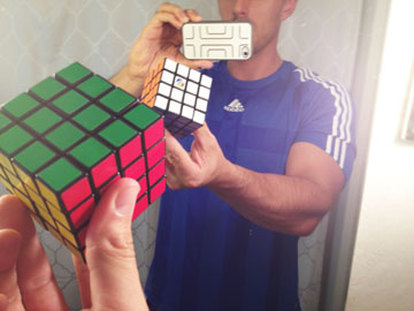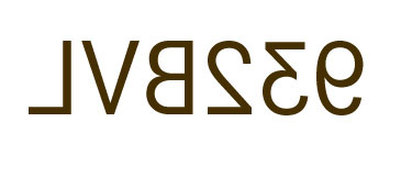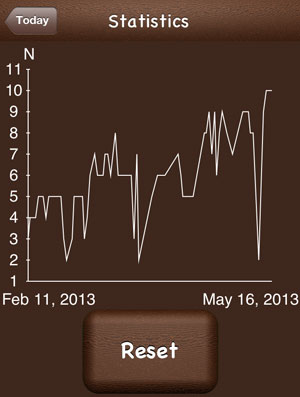 Recently I visited a gym environment where I hadn't been in three years. Every single "regular" was more or less doing the exact same routine, complaining about the exact same shoulder issues and looked worse than they did when I last saw them. The skinny lean guys were still complaining about how they cannot gain 5 pounds of muscle; and the big guys were marching about with more belly fat than ever. You might be thinking, "well, Jonathan, you have to understand that as people age..." AND I'm going to cut you off right there. Not true. Have you ever read Martin Luther King Jr.'s letter from Birmingham Jail? Time is neutral. What are you going to fill it with? More of the same unevolved waste, because your pride is higher on your priorities than improvement? Or are you going to get a coach? You need one. We all do. I get it. You already know everything. That's why surgeons just practice on pigeons at home. That's why music schools don't exist. That's why universities have never played an important role in the progress of anything. Sounds ridiculous? That's what my ear hears when people talk about not needing help in any area of their lives, especially fitness. I've seen the same people aimlessly pounding out endless hours in the gym to basically no avail for a decade. And this depressing fact is highlighted more every day as I age and continue improving, and as my clients and colleagues age and continue improving. We have to start with your head and your pride. A good friend of mine used to daily paraphrase Henry Ford, saying, "whether you think you can or can't, either way you're right." So if you believe you have to devolve as time passes by, you're right. Except, you aren't right. How do you explain people like Dana Torres? They aren't just genetic freaks. I've worked with lots of people like this. The examples exist, challenging your paradigm. Now, you have to do something with that cognitive dissonance. You can either let it change your mind, or you can cynically come up with some excuse for why it doesn't apply. And then, again, whether you think you can or you can't, either way you're right. This is the number one reason why you need a coach. You need at least one person in your life showing you the "impossible" is possible on a regular basis. A couple years ago NPR ran a segment on Sandy Palais (http://www.npr.org/2011/02/21/133776800/seniors-can-still-bulk-up-on-muscle-by-pressing-iron). For the first 63 years of her life she knew everything. It netted her osteoporosis. Never having done serious strength training before, she swallowed her pride, worked with some trainers and at 73 she could Deadlift 165 pounds. Does that sound like we're predetermined to degenerate as we age? We aren't. You can put away whatever equivocations you're already building in your mind about her, because she didn't have a very fit starting point and her routine isn't even that streamlined. It's just decent. But your pride is still there, keeping you depressed, disempowered, making excuses, thinking no one could possibly have something different that's helpful. You've built up all kinds of slick coping mechanisms so that you won't listen to anyone about anything: "I don't want to get too bulky;" "I don't want to get too skinny;" "everyone in my family has high cholesterol;" "I know what to do, I just don't do it." You know what? Save it. I've done over 10,000 consults and I've heard it all. A coach is someone there to help you go through the deep internal change about which you're unwilling, unwitting and incapable of doing efficiently on your own. Yes, there are all of the fundamentals: your program design and form is garbage; your workout regimen is based on thirty year old wisdom that was wrong back then; your chiropractor, nutritionist, last trainer, orthopedic surgeon, gp, and physical therapist all told you the wrong advice; you don't know about food sensitivities, inflammation, controlled ketosis, nutrient timing, biorhythms, effective supplementation, citizen medicine, and the like. Obviously, you need a coach because you don't even know enough to know that you don't know anything. However, I'm not even talking about that. Let's say you are extremely advanced, you've worked several thousand hours in the wellness industry and you KNOW what you are doing. The second you stop seeking coaches and new mentorship your skill set is passé and your knowledge base outside of your troubleshooting experience is obsolete. Sorry folks, that is just status quo in every industry nowadays. So, again, I get it. Good coaches are expensive and you're broke. That's why the trillion dollar tobacco industry is primarily funded by the lower third of the socioeconomic ladder. That's why the porn industry yearly revenue tops $57 billion. Guess what. People have, are and will continue to spend tons of money on vices and pointless purchases, oftentimes with money they don't even have (the AVERAGE American credit card debt is almost $16,000). So why do we still have this stigma about seeking help with fitness, nutrition, wellness and stress management? Without these pillars, people can't even function. But yet we have to shame ourselves and each other about going to a trainer or a therapist. Should I chide you for paying "just to have someone keep you company while you play the piano"? Should I chide you for paying someone "just to keep you company while you read your Calculus text book"? I mean, why bother even letting assisted self-improvement enter the conversation when it's so much easier to act self-righteous and self-medicate with a variety of dirty little secrets? The reality is that every person who hasn't admitted they needed help and paid for it in healthy ways has paid for some really unhealthy ways to cope instead. But they keep it a secret. Listen, I don't have any health issues because I take care of myself and I have been fortunate. Yet I have to pay top dollar on premiums, health care and taxes because you don't. So, let's not play the "expensive" game. Your pride costs you AND others more than several years of working with the most elite professionals in the world. Everyone needs a coach. Even the best coaches need coaches. Even you. Even me. But if you think you can't learn anything new and it's not worth it and you don't have time, either way you're right.
0 Comments
 Infants (the demographic with the lowest incidence of chronic disease and most positive central nervous system regulation) do best when they drink breast milk. There are some rare abnormalities, like chylothorax, wherein this isn't the case; but generally it's true. Breast milk content varies, but on average the macronutrient content in energy (as opposed to volume) is about 50% fat, 10% protein and 40% carbohydrates. Babies are growing rapidly, thus their carbohydrate needs are relatively high. How does this instruct us as adults? Well, if you're in a rapid growth cycle like babies, which really only pertains to bodybuilders or people trying to accelerate their cancer cell production, then you want to move your carbohydrate intake up to 40% or more. It will raise blood sugar, stimulating the pancreas to produce insulin which grows ALL TISSUE especially those cells which are upregulated for growth. Upregulated cells would include muscle cells after a workout, or cancer cells if you have cancer, or fat cells if you are sedentary. Also, insulin creates insulin resistance, leading to degeneration and aging. What does all that mean? If you are trying to maintain or have moderate increases in strength or muscle, carbohydrate intake other than fiber should be severely limited, except immediately following some workouts and/or in the evening when fat cells are most difficult to grow. If you are really active, like a 90 year old Okinawan karate teacher on his feet all day, then you might benefit from a little more white rice in the diet. By virtue of decreasing carbohydrate percentage, this means that your fat and/or protein intake will go up. If you want to grow fat at half the rate of a baby, there is a strong argument that a good balanced diet should look like 60% fat, 20% protein, 20% carbohydrates (again, not including fiber). If you don't want to grow fat at all, especially if your activity level isn't very high (keep in mind, kids move a lot more than you, and nature doesn't peg their carb needs higher than 50% of total calories), then dietary fat most likely should be higher. If you haven't done any heavy lifting, 15% or fewer calories coming from protein is probably fine, meaning fat percentage could go as high as 80+%. If you still think that dietary fat intake increases your risk of heart disease or some other ideas pulled from 1950s American nutrition science, please please please watch Gary Taubes' Googletech talk for free online and read my earlier blog posts. Prevent Dementia
http://newoldage.blogs.nytimes.com/2013/08/09/high-blood-sugar-linked-to-dementia/?_r=0 One of my clients sent me this link to a very recent Times article. In case it's news to anyone, I thought I might share it, along with some notes. Basically, these data gatherers found that the overall lower your blood sugar trends, the smarter you'll be and the more protected your brain will be forever. It's not news. There have been a number of studies finding that insulin resistance, thus neural cell death, occurs 10-20 years before you have any fasting sugars or A1c reading that trend high. By the time you have a diagnosis of Alzheimer's or dementia your were pulling fasting blood sugars in the high 90s and low 100s for 30 years and never did anything about it because you weren't diagnosed with diabetes. Sugar and insulin cross the blood brain barrier and contribute to dysfunction of receptors within the cells of your central nervous system. A fat burning metabolism, insulin sensitivity and controlled carbohydrate intake are absolutely essential to living the best life you can.  Imagine troubleshooting and coaching a client to get solid sleep when she has a specific disorder. The relationships within physiology are so complex that the sharpest sleep disorder medical professionals typically throw up their hands even after data gathering in a sleep study. They might put a patient on a CPAP and/or a sleep aid drug. But imagine your client wants to re-instruct her body on how to sleep solidly naturally. No drugs. No machines. Try the usual suspects: black out curtains, white noise, breathing techniques and meditation, melatonin, 5-HTP, theanine, licorice root, tea, elimination of night time alcohol, mineral balance and hydration issues, reduction of stress, elimination of inflammatory foods, balance of estrogen dominance, etc. Would you have stricken the ratios just right or figured out that pre-bedtime consumption of modified slow-absorption carbohydrates would be the linchpin? I wouldn't have either, until about a year ago. But I've been getting smarter. Understanding extremely complex relationships and problem solving within them is the product of many things. There is a baseline of knowledge needed, an inquisitive nature, but also a handle on how to fit various abstractions in their "proper place." Believe it or not, spatial intelligence plays a major role. Now I wouldn't say I was a spatial relationship idiot who has become a savant. I built things when I was a kid; and I've always been able to perform the abstract version of spatial intelligence: logic, reasoning, argumentation. But the quintessential measure of concrete spatial intelligence (http://www.iqtestexperts.com/iq-rubik.php) always eluded me. I could never crack the Rubik's cube. I just couldn't quite get a handle on how to move what out of the way in order to achieve symmetry and completeness in a finished design. I'd get a side or two, maybe three or more. And I wouldn't want to mess it up to get to the next place. And I wouldn't understand how to temporarily "mess it up" to un "mess it up." I tried the cube a few times as a child and once as a teenager. After quitting, I presumed I was born without that particular capacity, which suited me just fine, since I was an artist and musician. However, in my heated endeavor to expand my brain over the past 7 months, I decided I needed to take on mental skills which I just never seemed to have. Well, solving the Rubik's cube was one of them. So, I bought a standard Rubik's brand 3x3x3 cube and committed myself to getting a handle on the darn thing without ever removing and replacing a single sticker. Yes, I did consult tutorials, which, by the way, do not do a bit of good for someone who hasn't played with a Rubik's cube in 18 years. The tutorials made no sense. Even watching videos in slow motion didn't help... at first. You've got to figure, most of these things are made by people for whom the skill is intuitive. So their teaching method sucks; and their ability to make this foreign language into something native is more or less worthless. But then... something happened. As I studied this impossible matrix of colors, the relationships eventually became transparent. Moving a piece several times through an x axis, y axis and z axis in order to reach a new pattern of organization just became fluid. So how long does it take to acquire the skill? I'd say prepare yourself for 20-60 minutes a day for a week or two. But then, it's a cinch. And you will notice that your mental faculty for abstract spatial relationship does improve. I can reason better than I did before getting into cubing; and I can certainly look at physical configurations and much more rapidly get a handle on their relationship. Hold yourself to realistic standards, recognizing that the world record holders for cubing have spent over 10,000 hours on this; and a cube solve for them has converted to pattern recognition followed by involuntary finger dexterity. It pretty much isn't even an exercise in spatial relationship intelligence anymore for them. Once you "get it," initially you'll find that your solve times vary, until you learn how to attack different "problems." When I finally thought I had a good hold on things, it might take me 10 minutes once and 15 the next. Once I finally was consistently getting 90 second solves, I moved onto the Rubik's revenge, which is a 4x4x4 cube. Unlike every doofus on the internet says, it is not "pretty much" like the 3x3x3. You have to learn a whole new set of skills. Some transfer over. When I consistently was getting sub 5 minute solves on that, I moved onto the Professor's Cube, which is 5x5x5. It also has a few parities which muss things up a bit. I could solve it consistently around 15 minutes, and have now moved on to the 7x7x7 and up and the Gigaminx, which is not a cube at all but a 12 sided dodecahedron with layers of odd shaped pieces. Again, I want to impress upon the reader that I had never solved a simple cube before the age of 31. Now I work on the big ones. We are able to build new neural pathways and change ourselves dramatically. Want to find out how else you can expand your mind and self? Stay tuned for Get Smarter, part 3 and on.  Imagine sitting at a stop sign and a vehicle turning too widely scrapes its rear corner against yours. As you begin to realize what just happened, you look in your rear view mirror to see the same car smash headlong into the front driver side of the car behind you. The offender flees the scene almost hitting a line of cars all now swerving out of his reckless way; and he is off in the distance out of sight all in an instant. Are you ok? Is the lady in her van behind you ok? You call 911 and have to describe the white dodge caravan with license plate... the license plate which was barely visible and for only a second or so. It was flipped, because you saw it in your mirror and you weren't "paying attention" to that seemingly inconsequential detail. Would you remember it? I wouldn't have, prior to February. But I just did. I would like to think my focus, cognition and memory were generally above average through most of my life. However, since February, I've expanded into some new and interesting areas which, from time to time, showcase themselves in real world execution like the example above. Brain training has become a bit more in vogue with programs like Lumosity, and a little farther back with Brain Age on the Nintendo DS. There are apps. There are huge bodies of research on how to expand the mind and keep the brain young by exploring and pursuing new mental challenges: new languages, sudoku, crossword puzzles, logic puzzles, art, music, math, history, speaking, writing, reading - you name it. And I've already written a little about how much improvement I've seen in intensity of focus over long periods of time by getting one's fitness and nutrition dialed in. Every day there is a growing body of evidence mounting to show how you can stop, prevent or reverse central nervous system disorders with really simple regular exercise and dietarily controlling inflammation. Think how much more can you optimize a healthy CNS by practicing some of the same AND directly training the brain. So, I decided I'd share, more specifically, a few of these "brain hacks" insomuch as I have personally experienced them in a Get Smarter series. Part 1: Active Memory Active memory is applicable to a lot of different cognitive tasks; and arguably it is the best measure of intellect. Frankly, there is no totally agreed upon metric of intelligence. There are different IQ tests with different emphases and different scaling. I like Piagetian and non-piagetian ideas of cognitive development. Thus the debate over if an adult can improve IQ substantially or if it's even a valid talking point or how speed of processing plays into all this I'm leaving for another time. Provisionally, I think it's safe to say that active memory (aka - primary or short-term memory) is an important indicator nonetheless. And improvement is possible for those who believe it is possible. So we'll consider this in part 1. Over a year ago I became aware of a program which measures and builds active memory. It is available as an app, called Dual N-Back. At each level it visually lights up a square and via audio says a letter in randomized sequences wherein the sound and the picture are not synched AND follow disconnected sequences. So, simultaneously you must remember an unconnected sound and an unconnected visual cue. Over each level you have to remember these two streams of disconnected information over longer and longer sequences, learning to hold onto the information as long as you need it and throwing away the old sequence when it is no longer applicable. My description is actually much less complicated and confusing than the actual game. The game is difficult, frustrating, maddening, but ultimately works. Your brain fights the game, wanting to do something else. Only the dedicated will reap the benefits. Various Internet experts have worked on a protocol of 21 days in a row of dedicated 20-40 minute daily Dual N-Back training. Instead, starting in February I tried a few months of two or three days a week at 2-12 minutes. As I played the game I noticed that "how" you think changes. I began learning different ways and skills to encode information. The brain's neuroplastic resistance is interpreted as boredom, frustration or anger. I found that, at first try, even simultaneously remembering three letters and three unconnected visual cues which keep changing and recognizing them fluidly and accurately seemed impossible. I could not understand how I would "get it". But through force of will, my mind changed. And eventually 4-back became effortless. Then 5-back became natural. And so on, up to 10. If you haven't experienced the game, it will be extraordinarily difficult for you to understand just how hard it is, or just how rewarding progress in it feels. So I encourage the reader to download the app or one of the related ones and at least give it a couple tries. The most profound effect I found was an increase in my ability to juggle lots of incoming information and interpret the honesty or dishonesty, logical or illogical in people's words, body language and intonation and delivery synthesized at the same time. That is, you will find you just think more clearly, much less influenced by distracting emotion. Other not-immediately recognized benefits were, like during the hit and run, the ability to imprint important information while experiencing something stressful. I've included this graph of my performance, and more or less what you can expect with even limited bouts of training it. I'm currently taking a year off of this program to see if after 12 months I retain program specific performance. The down ticks in the graph are days when I opened the program but was interrupted before playing more than a couple minutes. If you're wanting to increase your ability to remember people's names or something similar, what you're looking for is long term memory enhancements, only the beginnings of which (via improved focus) will you get from Dual N-Back. For that and more, stay tuned for part 2 and on. |
Elev8 Wellness
|
LIVE. AWESOME.We offer the highest quality in personal fitness, nutrition, and mindset coaching, helping you achieve your fitness, health, wellness and performance goals no matter the obstacle. With virtual online training and private, in-studio training we make it easier to reach your wellness goals safely.
No more can't. No more not good enough. If you compete in a sport, let your mind no longer hold you back from being the greatest. If you don't, let your mind no longer hold you back from being the best version of you that you can be. Sign-up for a Tour Covid Screen Waiver Elev8 Waiver Become an Elev8 Instructor Space Rental |
6244 lyndale ave. s., minneapolis, mn 55423
|
© 2021 Elev8 Wellness LLC. All Rights Reserved. site map | contribute | SITE BY Sproute Creative


 RSS Feed
RSS Feed
